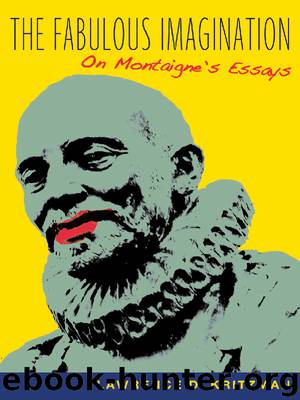The Fabulous Imagination by Lawrence D. Kritzman

Author:Lawrence D. Kritzman
Language: eng
Format: epub
Tags: Literary Criticism/European/General
Publisher: Columbia University Press
Published: 2011-12-13T16:00:00+00:00
6
EXCAVATING MONTAIGNE
The Essayist on Trial
Toy et moy nous rendons l’un à l’autre, par ce que nous ne sçaurions si bien rencontres ailleurs.
MARIE DE GOURNAY
In a chapter entitled “Montaigne’s Family Romance” I previously discussed the engendering of the Essays as a compensatory gesture that enabled Montaigne to overcome the loss of La Boétie by transforming a profound feeling of absence into a dialogic endeavor realized through the writing project.1 I suggested that the representation of the self as a recuperative act for the lost friend constituted an effort to endure the anxiety of separation by becoming “argument et … subject” (II, 8, 385) (“argument and subject” [278]) of his creation. This writerly act enabled the essayist to triumph over the nothingness of death through the narcissistic illusion of giving life to art. As Montaigne put it: “Platon adjouste que ce sont icy des enfans immortels [the children of the mind] qui immortalisent leurs peres” (II, 8, 400) (“Plato adds that these are immortal children who immortalize their fathers and even deify them, as with Lycurgus, Solon, and Minos” [291]). The act of paternity as textual project, as realized through the representation of the figure of the child in the textual space of “De l’affection des peres aux enfans” (II, 8) (“Of the Affection of Fathers for Their Children”), permitted that filial creation to become an epistemological locus capable of conjoining the affective with the cognitive: “Je n’ay pas plus faict mon livre que mon livre m’a faict” (II, 18, 665) (“ I have no more made my book than my book has made me” [504]). In this process the Montaignian text assimilated the knowledge that its wise progenitor was presumed to possess. By means of that symbolically nurturant act, it was able to assume a transcendence of sorts through an act of writing that projected a textual progeny more perfect than the biological workings of nature itself. For Montaigne, then, the resistance to death could only be realized through this gift of writing, the construction of a child of the mind, a textual offspring, whose being would be more perfect than life itself and would maintain the literary legacy of La Boétie (the gift of the library) through Montaigne’s gift of the book, or what he termed the “monumens des muses” (II, 8, 400) (“monuments of the muses” [292]).
Literary historians Marjorie Henry Ilsley and Elayne Dezon-Jones have made us aware of the biographical dynamics concerning the relationship between Montaigne and Marie de Gournay le Jars, although they have failed to discuss it within a textual and rhetorical framework.2 In 1595 Montaigne’s adopted daughter and literary executrix, the woman he called his “fi lle d’alliance” (II, 17, 661) (“covenant daughter” [502]) prepared for publication a posthumous edition of the Essays drawn from the writer’s 1588 handwritten addenda to that text. Based on the “Bordeaux Exemplar,” this posthumous edition was, as Richard Regosin suggests, derived from a copy of Montaigne’s original manuscript that Marie de Gournay had sent to Paris and modified to
Download
This site does not store any files on its server. We only index and link to content provided by other sites. Please contact the content providers to delete copyright contents if any and email us, we'll remove relevant links or contents immediately.
The Rules Do Not Apply by Ariel Levy(4946)
Bluets by Maggie Nelson(4539)
Too Much and Not the Mood by Durga Chew-Bose(4324)
Pre-Suasion: A Revolutionary Way to Influence and Persuade by Robert Cialdini(4200)
The Motorcycle Diaries by Ernesto Che Guevara(4078)
Walking by Henry David Thoreau(3943)
Schaum's Quick Guide to Writing Great Short Stories by Margaret Lucke(3368)
What If This Were Enough? by Heather Havrilesky(3299)
The Daily Stoic by Holiday Ryan & Hanselman Stephen(3288)
The Day I Stopped Drinking Milk by Sudha Murty(3183)
The Social Psychology of Inequality by Unknown(3011)
Why I Write by George Orwell(2940)
Letters From a Stoic by Seneca(2780)
A Short History of Nearly Everything by Bryson Bill(2679)
A Burst of Light by Audre Lorde(2586)
Insomniac City by Bill Hayes(2535)
Feel Free by Zadie Smith(2469)
Upstream by Mary Oliver(2382)
Miami by Joan Didion(2361)
